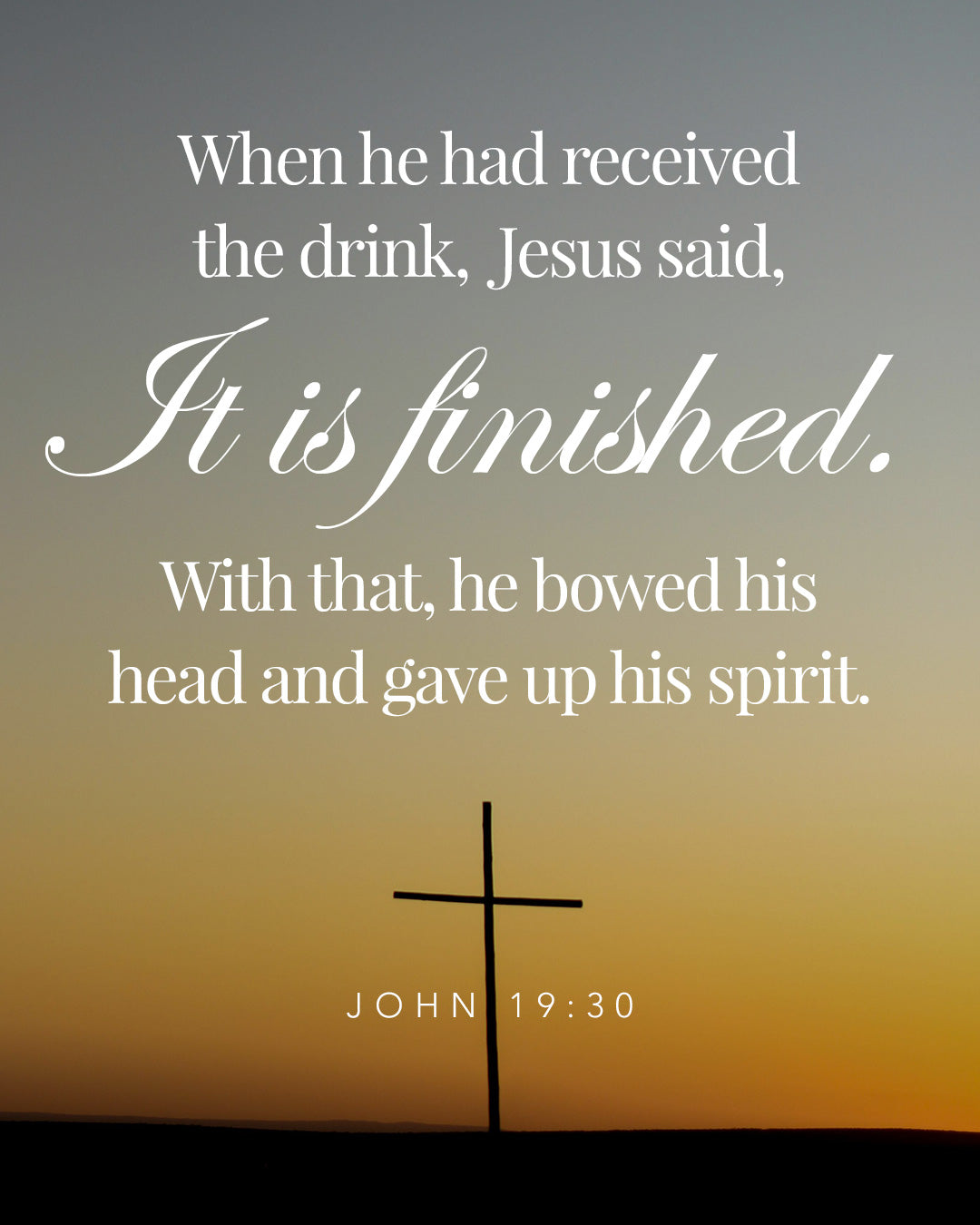John 19:30

“When he had received the drink, Jesus said, ‘It is finished.’ With that, he bowed his head and gave up his spirit.” (John 19:30)
Imagine the weight of mounting debt you could never repay—finally cleared; fully paid by some stranger. The weight lifts. Relief floods your chest. You're free, not because of anything you did, but because someone stepped in and paid it all. You're longing to meet this person to express your utter gratefulness. And because of this you are now free from the chains of debt, allowing you to live your life fully. That is the power behind this verse.
In these three powerful words—“It is finished”—lies the cornerstone of the Christian faith. Spoken from the cross, these words signify not defeat, but ultimate victory. This declaration reshapes not only our understanding of Christ’s mission but profoundly influences how we are called to live in response.
The Context
The scene at Calvary was both brutal and heartbreaking. Jesus had been betrayed, unjustly condemned, beaten, mocked, and nailed to a cross—a method of execution reserved for the worst criminals. Amid excruciating physical agony, emotional anguish, and spiritual weight, Jesus uttered His final words, "It is finished."
In the original Greek, these words—tetelestai—were significant. They were commonly written across receipts or invoices to indicate a debt had been completely paid. As Jesus spoke these words, He was declaring a cosmic transaction completed. The debt humanity owed because of sin was fully settled, never again to be held against us.
The Deeper Meaning
“It is finished” indicates not just an end, but a fulfillment. Jesus didn't merely endure suffering; He perfectly fulfilled the requirements of God's law, every prophecy made about the Messiah, and completed the redemptive mission set before Him. This single moment, often mistaken as an end, was actually the turning point for all humanity.
The cross signified the ultimate victory over sin and death. Where humanity was once separated from God by an immeasurable chasm of guilt and shame, now stood a bridge built by Christ's sacrifice. No longer would sin have dominion over humankind; no longer would death claim ultimate victory.
What Jesus Accomplished
- Redemption: Jesus paid the full price for humanity's sins. Our guilt, shame, and condemnation were removed entirely by His sacrifice. We no longer need to live burdened by past failures or present struggles, as forgiveness is wholly available.
- Reconciliation: Through His sacrifice, Jesus restored our relationship with God. The veil in the temple—symbolizing separation between a holy God and sinful humanity—was torn. Now, every person has direct access to God, welcomed into intimate fellowship with Him.
- Restoration: Jesus' death brought about a profound restoration, not merely of our relationship with God but also our identity and purpose. We are now defined not by our mistakes or achievements, but by our place in God's family. Our purpose becomes deeply aligned with God's kingdom values.
Living in Response to the Cross
The implications of what Jesus accomplished on the cross should radically transform our daily lives:
- Live in Freedom: Because Christ has fully satisfied the debt of sin, we can live without fear of condemnation or bondage to guilt. This freedom is not permission to live carelessly but motivation to live joyfully and purposefully.
- Live with Gratitude: Recognizing the extent of Christ’s sacrifice fosters genuine surrender, humility, and thankfulness. Our lives are transformed to become acts of worship and gratitude, reflecting His love through every decision and action.
- Live with Purpose and Mission: Understanding what Jesus has done drives us to share this good news. Our purpose shifts from personal gain to serving others, reflecting Christ's selfless love and sacrifice.
Common Misunderstandings
We sometimes mistakenly believe we need to contribute to Christ’s finished work through our good deeds or religious activities. Yet, "it is finished" assures us the work is already complete. Salvation and acceptance with God aren't things we earn or maintain through our efforts; they are gifts freely given by Christ’s sacrifice.
There is nothing else we can or need to do to earn salvation. Our good works and spiritual disciplines become meaningful responses to God's grace, not desperate attempts to gain His approval.
Reflecting on the Finished Work
Jesus' declaration "It is finished" is more than a historical moment—it’s an eternal turning point. It opens a door for every person to live freely, forgiven, and fully reconciled with God. But this sacrifice wasn’t meant to be admired from a distance. It calls for a response.
How are we living in light of what Christ has finished? Are we honoring His sacrifice with lives that reflect its worth? Are we holding this truth close while also sharing it with others who need to hear it?
Jesus died so that we could truly live—not just for ourselves, but for something greater. Let’s not waste what He paid in full. Let’s live in a way that echoes His love, points others to His grace, and makes it clear that His death was not in vain.
The gift is free. But how we live because of it—that’s what tells the world we know its value.
